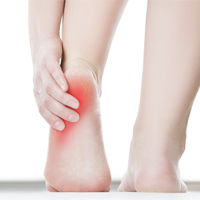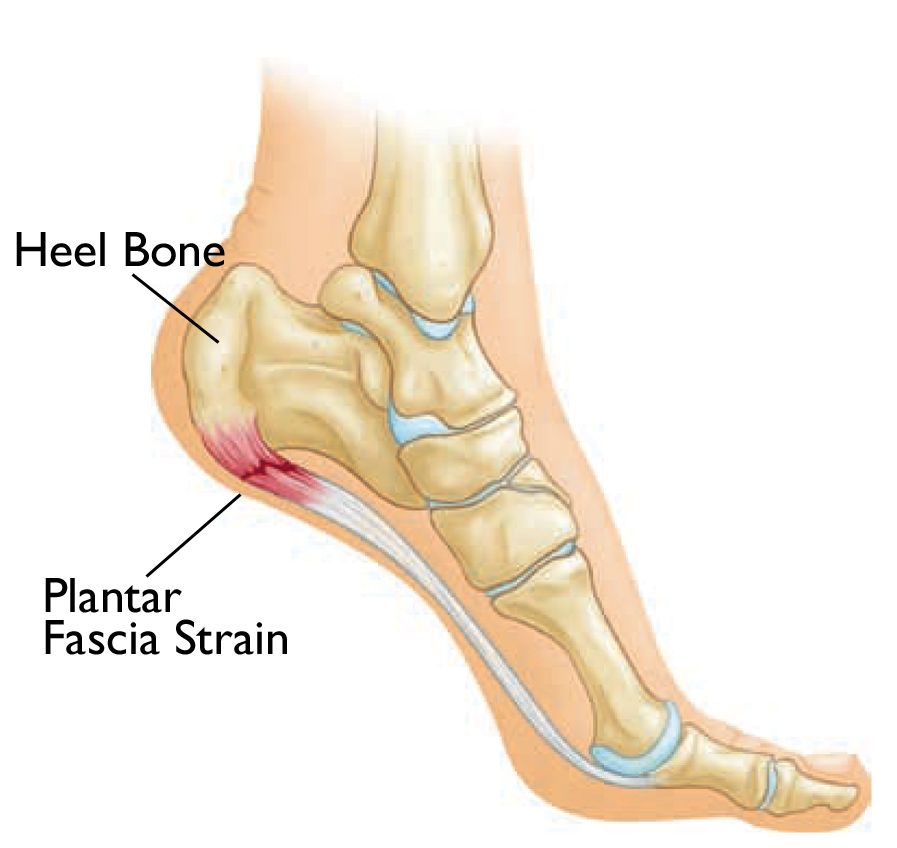Heel pain- Plantar Fasciitis
Have An Emergency
Book your visit
Heel pain- Plantar Fasciitis
 Plantar Fasciitis is one of the major reasons behind the pain in the bottom of the heel. The plantar fascia is a thick web-like ligament that connects the heel to the front end of the foot. You can say that it acts as a shocker absorber which not only supports the arch of your foot but also helps while walking. Wear and tear of the fascia or inflammation can lead to plantar fasciitis. In many a cases, it may be associated with a bony overgrowth at lower aspect of the heel bone, also called bone spur. Bone spurs though present in cases with plantar fascitis are not known to be the cause of the problem.
Plantar Fasciitis is one of the major reasons behind the pain in the bottom of the heel. The plantar fascia is a thick web-like ligament that connects the heel to the front end of the foot. You can say that it acts as a shocker absorber which not only supports the arch of your foot but also helps while walking. Wear and tear of the fascia or inflammation can lead to plantar fasciitis. In many a cases, it may be associated with a bony overgrowth at lower aspect of the heel bone, also called bone spur. Bone spurs though present in cases with plantar fascitis are not known to be the cause of the problem.
So, if you are complaining of pain at the bottom, consult with the best orthopedic doctor for the treatment for Plantar Fasciitis.
- Those who are obese are more prone to plantar fasciitis.
- It is slightly more common in women as compared to men. Pregnant women may experience bouts of pain due to plantar fasciitis.
- Poor footwear is also attributed to be a cause.
- If you are a long-distance runner, then you are at a high risk of developing plantar fascia problems.
- Tight Achilles tendons that attach calf muscles to the heel may also predispose people to plantar fascial pain.
- People with foot arch abnormalities are also prone to plantar fasciitis.
Some of the symptoms of Plantar Fasciitis are as follows-
- Observing pain at the bottom or heel or bottom mid-foot area. It can affect one or both feet
- Pain in the morning is worst as you may find difficulties while walking out from your bed. People specifically complain of “start up” pain
- After prolonged activity, this continuous pain increases inflammation and irritation. People who are dealing with plantar fasciitis often complain of pain while doing exercise or just after stopping exercises.
Non-operative treatment is the cornerstone for management of plantar fasciitis. Most of the cases resolve with a dedicated physiotherapy program to stretch plantar fascia as well as calf muscles. Insoles, heel cushions/ heel cups, night splints, change of footwear as well as heat and medicines also work well. If the pain persists, 3-6 sessions of Extracorporeal Shock Wave Therapy (ESWT) may also be needed to alleviate the pain. Steroid injections have been advocated but they have to be used in caution in view of risk of rupture of plantar fascia. In a handful of patients, where none of the treatment might have worked, surgery may be needed to release the plantar fascia or tight calf muscles. Dr Anuj Chawla is one of the few surgeons in India with an experience of managing plantar fascitis with shock wave therapy and doing endoscopic surgeries for plantar fascitis.Heel pain shouldn’t be taken for granted as it can affect your quality of life. So, without making any further delay, head straight to Dr. Anuj Chawla for getting effective treatment.
- + Causes
-
- Those who are obese are more prone to plantar fasciitis.
- It is slightly more common in women as compared to men. Pregnant women may experience bouts of pain due to plantar fasciitis.
- Poor footwear is also attributed to be a cause.
- If you are a long-distance runner, then you are at a high risk of developing plantar fascia problems.
- Tight Achilles tendons that attach calf muscles to the heel may also predispose people to plantar fascial pain.
- People with foot arch abnormalities are also prone to plantar fasciitis.
- + Symptoms
-
Some of the symptoms of Plantar Fasciitis are as follows-
- Observing pain at the bottom or heel or bottom mid-foot area. It can affect one or both feet
- Pain in the morning is worst as you may find difficulties while walking out from your bed. People specifically complain of “start up” pain
- After prolonged activity, this continuous pain increases inflammation and irritation. People who are dealing with plantar fasciitis often complain of pain while doing exercise or just after stopping exercises.
- + Treatment
-
Non-operative treatment is the cornerstone for management of plantar fasciitis. Most of the cases resolve with a dedicated physiotherapy program to stretch plantar fascia as well as calf muscles. Insoles, heel cushions/ heel cups, night splints, change of footwear as well as heat and medicines also work well. If the pain persists, 3-6 sessions of Extracorporeal Shock Wave Therapy (ESWT) may also be needed to alleviate the pain. Steroid injections have been advocated but they have to be used in caution in view of risk of rupture of plantar fascia. In a handful of patients, where none of the treatment might have worked, surgery may be needed to release the plantar fascia or tight calf muscles. Dr Anuj Chawla is one of the few surgeons in India with an experience of managing plantar fascitis with shock wave therapy and doing endoscopic surgeries for plantar fascitis.Heel pain shouldn’t be taken for granted as it can affect your quality of life. So, without making any further delay, head straight to Dr. Anuj Chawla for getting effective treatment.

